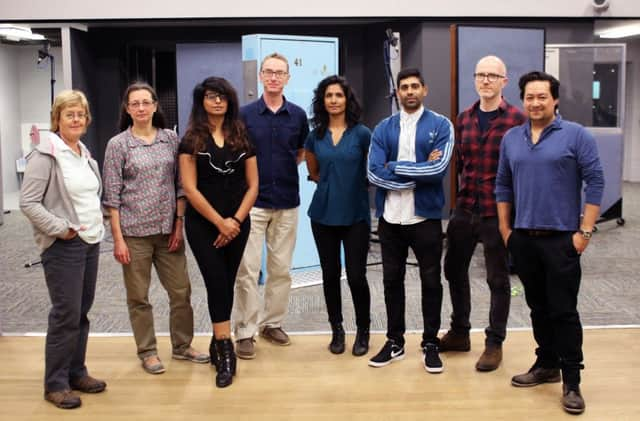Radio play inpsired by Partition takes to the stage


Earlier this year I walked the Dalesway with my two oldest friends to mark the fact that we’d reached the ripe old age of 40.
In the middle of the 83 mile trek I wasn’t entirely sure how we were going to get to the finishing point up in the Lake District. It was only really in retrospect that I was able to look back and think ‘I’m not entirely sure how we did it, but we did it’.
Advertisement
Hide AdAdvertisement
Hide AdI’m writing this on Wednesday night, or as I’m calling it, Day Three of another epic undertaking.
This one is physically less challenging than the Dalesway, but mentally it’s a mountain.
Tonight the cast and crew open Partition, a joint production between BBC Radio Leeds and the West Yorkshire Playhouse.
It’s the first time the two organisations have worked together and while all the effort right now is focussed on getting the demands of this hugely technical show right, there is a constant refrain in the back of my mind reminding me that while it’s a huge privilege to be the writer that brings the Playhouse and the BBC together, there is a fair amount of pressure.
Advertisement
Hide AdAdvertisement
Hide AdThe reason it’s such a technical show is that this is no ordinary theatre show: it’s a radio play, on stage.
How does that work?
It’s an excellent question, one I’ve been asked several times during interviews about the play over the past month.
Until this week, the truth is that I wasn’t entirely sure how it works.
Partition is the brainchild of BBC Radio Leeds editor Sanjiv Buttoo, who first commissioned me as a playwright last year when I was asked to write a schools play for a project called Children of the Somme.
Advertisement
Hide AdAdvertisement
Hide AdIt was the first time the radio station had commissioned a play and the reception from audiences and the BBC backers was humbling – the organisation ended up funding a tour of the play of Yorkshire schools, another BBC first.
This year, knowing it was the 70th anniversary of the Partition of India, when the British granted the subcontinent independence and left behind an unholy mess, Sanjiv commissioned me to write something that would mark the anniversary.
I was asked to write a play that would somehow tell the story of what happened when the country of India was left to its own rule and Pakistan came into being.
It had to last 45 minutes.
It was a ridiculous task. As a half-Bangladeshi, half-English Brit with a deep interest in my culture and heritage, I had probably more of an understanding of Partition than most, but my knowledge was limited.
Advertisement
Hide AdAdvertisement
Hide AdIt was about a week into my research that I realised the story of Partition cannot be told in 45 minutes.
It took Salman Rushdie over 400 pages and a lot of magic realism.
The answer was to contemporise the story, look at how it continues to affect lives today.
Partition is, then, a story of a young couple, a Sikh and a Muslim, hoping to marry across a religious divide that the British helped to sour 70 years ago. Set in Leeds, it is a story rooted in Yorkshire as well as India.
Advertisement
Hide AdAdvertisement
Hide AdI’m still avoiding the question. How to turn it into a radio play? It hasn’t really been my problem since I delivered the final draft a couple of months ago. The radio version was recorded in the world- class BBC studios in Salford in July, ahead of the broadcast on August 14, with a team of world- class technicians and a brilliant director called Stefan Escreet – he’s the one to whom I handed the problem of staging Partition.
Having worked with Stefan on my previous play The Chef Show, I knew he was the perfect man to bring this script to life. We have four actors, Balvinder Sopal, Mez Galaria, Dominic Gately and Darren Kuppan who are playing about a dozen roles between them: easy on radio – just stop recording, get the actors to do a different voice and the technical geniuses will edit it together. Bit trickier on stage when you can’t hide the magic from the audience. The only way to do it is to allow them to see the joints.
Which is why the West Yorkshire Playhouse literary manager Jacqui Honess-Martin needs huge amounts of credit.
Initially it looked like I was going to write a radio play – and then adapt said play for the stage. At an early meeting between the BBC and Playhouse teams, Jacqui suggested we simply put the radio version on stage, with mics, live sound effects, played-in recordings, the lot.
Advertisement
Hide AdAdvertisement
Hide AdAn elegant solution that cut my workload in half? I’ll take that.
So here we are, on Day Three and I’m realising that what that all means is that the actual process is one long technical rehearsal. Usually you’d spend a few weeks rehearsing a show and then spend a few days getting all the technical bits – lighting and sound cues – built in on the stage. That wasn’t going to cut it with this. We’ve been in the Courtyard theatre at the West Yorkshire Playhouse since Monday with an incredibly talented team, simply getting the technical bits right.
It’s been a fascinating week of watching the worlds of stage and radio drama crash together.
Tickets for the production all went within a couple of weeks, so you’re unlikely to get one now if you haven’t already booked (there may be returns).
Advertisement
Hide AdAdvertisement
Hide AdIronic that a production about a country being rent asunder marks the start of a new partnership between a theatre and the world’s greatest broadcaster.
The end result... well, we’ll find out tonight.